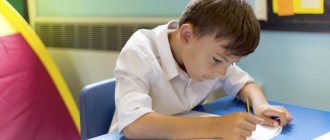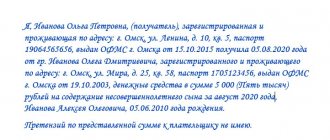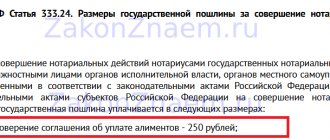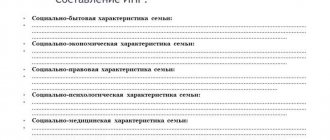What should be in the characteristics
There are no specific requirements for the document established at the level of regulatory legal acts. For an objective and comprehensive presentation of the material, it is necessary to indicate the following items.
- Information about the child (last name, first name, age or date of birth, place of residence)
- Attitude to the educational process – diligence, attentiveness, diligence, hard work (or the absence of these qualities or some of them).
- Participation in school events. Execution of public orders. The degree of active position and interest in extracurricular activities.
- Behavioral characteristics - temperament, aggressiveness or peacefulness, willingness to interact with other children, self-esteem.
- Relationships in the guardianship family: the degree of participation of the guardian in the child’s life, the level of trust between family members.
The characteristics of the supervised student are signed by the school principal and class teacher.
Criteria for assessing the development of personality traits
To objectively assess the child’s condition, one should be guided by criteria that determine the degree of development of a particular personality quality.
- Work ability.
- High—the ability to perceive material is maintained throughout the entire school day, but the ability to perceive material is lost.
- Ability to think independently
- High - the student analyzes the taught material, identifies the problem, and is ready to discuss and put forward versions.
- Medium - looks for ways to solve the problem by analogy with previously occurring situations, but independently.
- Low - unable to make independent decisions, turns to teachers and other children for help.
- Self-control.
- High - the ward does not require supervision from an adult, takes a responsible approach to preparing homework, studies and retells the assigned material without reminders.
- Medium - a one-time reminder of the need to study and complete tasks may be required, which in general does not affect the learning process.
- Low - no self-control.
- to the perception of the material.
- Medium - information is absorbed well, but at the end of the day fatigue sets in.
- Low - the child gets tired quickly, shows lethargy, in the middle of school
- Speed of learning material and completing tasks.
- High - learns according to the proposed program at a good pace, quickly “grabs” the material.
- Average - learning speed is within the norm, does not stand out from the class.
- Low - it takes longer than other students to prepare assignments.
- The ability to highlight the main thing in the material
- High - knows how to isolate the main idea and omit minor details. Capable of analysis and drawing conclusions.
- Medium – has problems with analytics and summarizing, which does not affect the process of acquiring knowledge as a whole.
- Low - the ability to highlight the essence of the material is absent.
Characteristics of a supervised elementary school student
Taking into account the above recommendations, the characteristics of the supervised student can be presented in the following format.
Characteristic
1st grade student
secondary school No. 76
Khoroshavina Ivana
Khoroshavin Ivan, born June 20, 2010, lives: Novosibirsk, st. Green, 3/2-12. in the guardian's family. He has been studying at school since 09/01/2017. Ivan enjoys learning, has a high degree of efficiency, and is active during classes. Prepares homework independently. The ease of perception of information and the fast pace of preparing tasks somewhat interfere with the formation of diligence, which does not affect the learning results. The boy is independent and neat. He carefully puts his things in his backpack, checking that they are complete. Dressed cleanly, according to the season, neat. Does not allow violations of discipline during lessons or breaks. He is modest and cannot always fight back against offenders. Tries to avoid potentially dangerous situations. He is not registered with the KDN. Doesn't skip classes. He has many friends and is drawn to high school kids. Welcoming, friendly. Ivan Kolosov’s guardian Olga Andreevna attends parent meetings in full and actively asks questions. Worried about the child, he regularly calls the class teacher. She brought potted flowers to decorate the class. The boy happily runs towards O.A. Kolosova when she picks him up from school. It is obvious that a trusting relationship has developed between the guardian and Ivan.
School director _________________________S.P. Tolkova Class teacher: ___________________G.Kh Semenova
Sample characteristics for a guardian
He is being brought up in the family of his grandmother Natalya Nikolaevna Vasilyeva, the guardians take good care of Danil’s studies and appearance, regularly call the class teacher to find out his progress or warn about illness, worry about the child, take an active part in the life of the class and the renovation of the classroom. Physical development corresponds to the age norm.
- Bodies of inquiry or investigation during the investigation of crimes. It can clarify for the investigator whether a given person had a motive to commit a crime, and will also show whether the work is being carried out in the right direction;
- The court when considering a criminal case.
Characteristics of middle and high school students
The profile for a high school child under guardianship should contain information about the child’s preferences in a particular discipline.
Characteristics of an 8b grade student
secondary school No. 76 Belova Ekaterina
Katya Belova, born May 15, 2003, lives at the address: Novosibirsk, Trudovaya Ave. 17 with her grandfather N.T. Belov. and grandmother Belova R.U.
Ekaterina is in 8th grade, grades for the first half of the year are “4” and “5”, she is a confident student. Logical thinking is developed satisfactorily. Stable, but needs reminders to do homework. Doesn't show activity in lessons. Answers confidently, even without fully knowing the material. His behavior is good, but he has a habit of being late for the first lesson. He gets into arguments with classmates easily, but can stop in time. Hot-tempered. She is suspicious, driven, and does not strive for leadership. Reaches towards friends who are stronger in character. Participates in school events without enthusiasm. She is polite with teachers, obedient, listens to comments. If I'm wrong, I'm ready to apologize. She takes additional history classes and has a humanitarian mindset. Exact sciences are more difficult and require more time to study. He is interested in sports dancing and has received awards for his active participation in regional competitions. Takes special courses at NSU for admission to the Faculty of History. Relations with grandparents are very warm, there are no conflicts. Despite their advanced age, relatives, whenever possible, attend parent-teacher meetings and assist in improving the school grounds. Dressed well, everything necessary for training is available.
School director _________________________S.P. Tolkova Class teacher: ___________________G.Kh Semenova
Sample characteristics for a guardian from school
Kudryavtseva Ekaterina Semenovna, born in 1970, passport 6912 No. 741243, issued by the department of the Federal Migration Service in the Petrovsky district of Semenovsk on 05/09/2021, department code 121121. Kudryavtseva E.S. registered at the address: Semenovsk, Kirova Ave., 25, kV.12 from 06/12/2021. Over the years I have known Ekaterina Semyonovna only on the positive side. Kudryavtseva takes an active part in community issues and respects the rights of her neighbors. Provides assistance in landscaping the local area. Makes payments for housing and communal services in a timely manner. Together with Kudryavtseva the following are registered at this address:
So why do the guardianship authorities insist on providing it? Everything is very simple. It helps to understand what a future trustee is like and how he behaves in various situations.
, what are its strengths and weaknesses.
Characteristics of a successful school student
If a child has strengthened his position after being placed under guardianship, this must be reflected in the characteristics
CHARACTERISTICS of a 5th grade student
secondary school No. 76 Semenova Semyon
Semenov S. born September 15, 2016, lives Novosibirsk, Frunze Ave., 119-3. Parents are deprived of parental rights. The boy and his younger brother Roman (2 years old) are under the care of his own aunt Rodimina Asya Trofimovna. The boy is physically well developed and is involved in the swimming section. Has a congenital disease of the respiratory system (asthma). Semyon strives to gain knowledge and excellent grades. Stable in all disciplines. Incredible performance allowed me to finish the second half of the year with “5” grades in all subjects. A good analyst immediately identifies the main idea from the proposed material. During the period of care (three years), positive changes in learning and behavior are obvious. Assiduous, diligent. Semyon works independently, with the support of teachers, to develop his character. Trying to get rid of low self-esteem and increased anxiety. He is friendly and friendly with his classmates. Took charge of the 2nd grade children under his care. Very affectionate, grateful for the good attitude. She studies in a theater group at the Palace of Youth Creativity. He is interested in literature. The relationship with my aunt is smooth and obedient.
School director _________________________S.P. Tolkova Class teacher: ___________________G.Kh Semenova
Characteristics of a lagging student
When describing a student who cannot cope with the program, emphasis should be placed on features that interfere with the assimilation of knowledge in full.
Characteristics of a 7th grade student
secondary school No. 76 Fatyanov Sergei
Sergey, born November 5, 2006, lives in Novosibirsk, village. Svetly, 2. Guardian - grandmother Fatyanova Maria Petrovna. Parents died in 2008. The boy has been studying at school for three years; before his grandmother’s guardianship was granted, he was in orphanage No. 45 in Berdsk. The stay in the shelter and the death of his parents, as well as the long period of registration of guardianship by his grandmother, left an imprint on Seryozha’s psychological state. The child is withdrawn, distrustful, and is influenced by the tragedy that has occurred. Difficult to socialize. The boy has poor school preparation. There are intellectual impairments. Has difficulty understanding assignments, has difficulty mastering the material, and requires repeated repetitions. When he comes into care, he tries to improve in all subjects and masters new learning skills. However, the existing neglect does not bring the desired results today. Academic performance is satisfactory, grades “4” only in drawing and sketching. Russian and foreign languages, literature, social studies are given with effort. There is motivation to study. However, there is no independence, he is afraid to answer publicly at the board. Has a weak memory, learned material is quickly forgotten. Sergey is a sympathetic, kind boy. However, he is reserved with classmates and is emotionally closed. He does not like to carry out public assignments, trying to stay aloof. At the same time, the boy tries to adapt to new conditions, listens to his grandmother, and is very afraid of returning to a government institution. In 2021, I visited a social educator and psychologist.
School director ______________________________ S.P. Tolkova Class teacher: ___________________ G.Kh Semenova
An example of a positive characteristic for a boy student
Alexander Ivanov has been studying at the State Institution “Secondary School No. 19” in Sverdlovsk since the first grade.
The student has good physical and mental development. Responsible and hardworking. Possesses independent work skills. Able to compare, analyze, and clearly express his thoughts. In the 8th year of study, Alexander moved to the mathematics class. He prefers humanities subjects and is interested in history and law.
Alexander complies with the school regime and established rules of behavior. Doesn't miss classes for no reason.
Main character traits: calm, balanced, avoids conflicts.
Performs any assignments unconditionally and responsibly. Actively participates in school events.
There are no bad habits.
He is hardworking, possesses the necessary work skills, and is careful and precise in his work. Self-confident, accurately assesses his own capabilities, strives for success, primacy, decisive, persistent.
He is distinguished by good manners and modesty. Tactful, friendly. He is friends with his classmates. Very obliging, worries about the outcome of the assignment. Enjoys authority.
Parents are interested in the success of their child. Constantly communicate with the class teacher. Provide all possible assistance in matters of class functioning.
Characteristics for the military registration and enlistment office for a positive student
Igor Shishkin has been studying at the State Institution of the Russian Federation “PSOSH No. 17” in Pskov since the 1st grade. During all years of study at school, he follows the internal rules and does not violate discipline in lessons. He studies mainly for a grade of “4”. Has a mathematical mind.
Intellectually developed, well-read, has a rich vocabulary. Able to organize material in a logical sequence, analyze and draw conclusions.
Constantly improves, uses additional literature when preparing for lessons, expanding his own knowledge beyond the school curriculum.
He is efficient and takes a responsible approach to completing the assigned task. He is distinguished by his ingenuity, is erudite, does not succumb to the influence of others, and is independent.
He has the makings of a leader, is an example for his classmates, and never refuses to help them. Sociable, tactful in communication. Adequate to criticism.
Has a good level of physical fitness. Participant in many school and extra-school sports competitions. There are no bad habits.
Igor lives with his father, mother and older brother. The positive microclimate of the family has a beneficial effect on the boy. Parents are not indifferent to Igor’s fate; they are constantly interested in his successes.
The characteristics are given for presentation to the military registration and enlistment office.
Adding a characteristic for the guardian
Popova Anastasia, born November 1, 2021, entered 1st grade in September 2021. During the period of study she showed herself to be a diligent, efficient, responsible student. She is always ready for schoolwork and keeps her school supplies in order. In class she is active, collected, and attentive. Throughout this time, the school curriculum was successfully mastered.
By nature, Anastasia is a calm, active girl. Quite quickly she found friends. She established herself as a diligent, hardworking, attentive student. Grandmother is a guardian and is always interested in Sveta’s academic progress. Attends school regularly. The child is neat, always combed and ready for school.
For a student with a low level of knowledge and performance
Nikita Kornilovsky has been studying at the State Institution “KSOSH No. 2” in Kirov since the 1st grade.
Throughout his time at school, he showed such qualities as laziness and indifference to the educational process. Does not show due attention to the proposed educational material, is distracted by extraneous activities and ignores teacher comments. He is more interested in communicating with his classmates. Passive behavior in the classroom leads to poor academic results. Doesn't complete homework assignments, but is a master at copying. Doesn't miss classes for no reason.
Shows a certain interest in humanitarian subjects, loves poetry and history.
Has the necessary work skills, but is not proactive enough to apply them. Gives greater priority to participation in class and school social events.
Loves attention from the outside, demands respect for himself and his opinion. In a conversation he may use obscene words, considering this the norm of behavior.
He has a significant level of athletic training and goes to the gym. Does not accept bad habits.
He is friendly with his peers and enjoys authority. He is not always polite with elders. Does not tolerate injustice.
Lives with his father, mother and younger brother, whom he cares for very much. Parents regularly appear at school and communicate with the class teacher. They are actively trying to improve Nikita’s knowledge level.
a selection of ready-made characteristics for a student, as well as samples and recommendations
From Psychologist
Post updated
Jan 7, 2020 11,291,873 Share
pedagogical characteristics (more than 50 pieces), as well as instructions and recommendations for writing your own characteristics. Year of publication: 2009 - 12 Format: doc to rar. archive Number of pages: many Size: 5.2 MB Quality: good
A student's characteristics are one of the most popular documents in the work of a class teacher, head teacher, educational psychologist or social educator.
The characteristics used in educational practice are divided into three main types - psychological, pedagogical and psychological-pedagogical. In this collection we have collected all three types of characteristics, as well as samples, templates and recommendations for writing them.
In the archive, which is available for download via the link located at the end of this article, you will find examples of ready-made characteristics for students of different classes, examples of positive characteristics for successful students and negative ones for weak ones, recommendations and templates for independently writing ha-ki of any type.
In total, the selection includes more than 70 ready-made characteristics + forms, templates and recommendations for writing them.
In most cases, the specification includes the following sections:
1. General information about the student. (Last name, first name, patronymic, age, what grade he is in, nationality, information about parents, etc.). 2. State of health and physical development. 3. Conditions of family education. 4. Student interests. 5. Intellectual development. 6. Features of temperament. 7. Strong-willed qualities. 8. Communication skills in relation to the class staff and teachers. 9. Level of aspirations and self-esteem 10. Moral and ethical qualities Conclusion.
Characteristics of the parent: sample
The psychological characteristics of the parent should show how emotionally comfortable the child is in the family, what example of behavior the father or mother sets for the child, and how universal human values are transmitted in the family.
Mother . (mother's full name), . year of birth, since 2021 is on maternity leave to care for a child (younger brother. (student’s name, surname)). By education, she is a dentist; before her vacation, she worked in city dental clinic No. 2.
What does the characteristic look like?
Let's look at a sample characteristic from a school for a student who complies with the rules for drawing up this document.
Example
Characteristics for a 6th grade student from the class teacher
Municipal educational institution secondary school number 112
Barinov Maxim Viktorovich
Maxim Barinov, born November 6, 2002, lives at Saratov, Tikhaya Street, house 15, apartment 7, has been studying at school number 112 since the 1st grade. Throughout his time, he has shown how disciplined, hardworking and honest he is in matters of study. Has good results in basic subjects and exact sciences.
Has the ability to study history, social studies, literature and the Russian language. Learns to the fullest extent of his abilities and does not need additional outside supervision. He has good visual and auditory memory, works quickly and confidently, and remembers educational material efficiently.
Throughout his studies, he showed the presence of logical and creative thinking. Has a broad outlook. Speech is well developed and delivered. In class he is always attentive, active, diligently completes his homework and comes to the aid of his classmates.
Treats public assignments conscientiously. He was elected president of the school on the day of self-government. He actively takes part in the public life of the school and is a member of the student assembly. Participant in city and school Olympiads, awarded a certificate of honor. Always complies with the established rules of behavior within the school, does not ignore the requirements of teachers.
Showed good health. Enjoys sports and physical education. Plays basketball. Neat, looks neat, keeps all things in order.
The character is modest, balanced, disciplined and reasonable. Independent. Friendly and responsive. Moderately active. He is respected among teachers. In class and school he has many friends and a wide circle of acquaintances. Active and happy to make contact with people.
Leads a healthy lifestyle. No bad habits were noticed.
Independent in judgment.
I am ready to listen to fair criticism and take it into account. Truthful towards parents and teachers. The family has created an atmosphere that helps to concentrate on studies. The relationship between parents and child is respectful.
Signature of the director of Municipal Educational Institution Secondary School No. 112.
Signature of the class teacher.
Flat rent
Emotional, lively, sociable, disciplined, lately she has been reacting aggressively to teachers’ comments and not fulfilling their demands. Has many friends among his peers. A developed sense of collectivism, camaraderie, a sense of duty, and decency. A case of alcohol consumption was noticed (according to the parents). The girl maintains relationships with older boys.
The characterization should not be superficial. The form indicates all aspects related to the attitude to work, the manifestation of the applicant’s professional and personal qualities. Therefore, the provision of as complete data as possible is encouraged.
How to write a positive review?
Before moving on to drawing up and writing such an important document, a pedagogical characteristic for a student, you need to understand what kind of characteristic for a student is required in a particular case. In order to describe the psychological qualities of a student, it is better to contact a school psychologist. It is he who can carry out special conversations and research. As a result, a psychological portrait of the student will be drawn up, which will help in drawing up a profile for the student.
All positive characteristics for a student in grades 1–4 are compiled by the teacher, who conducts lessons in all subjects. But the content of such a document will depend on the purpose for which this paper is needed. The minimum volume of such a description is from 800 to 1000 characters. But the maximum volume is not specified.
When such a document is generated for a third-party organization, it must be made on a corporate sheet with watermarks and a coat of arms, where not only the date is indicated below, but the signature of the teacher and director is indicated.
Purpose and content
Children are the most defenseless in the harsh realities of the cruel modern world. It is with the aim of protecting this category of the planet’s population that special guardianship and trusteeship bodies have been created in each state.
Their powers/official responsibilities include constant monitoring of compliance with the rights of the child in the family, on the street, in educational and other social institutions. Characteristics help to collect and classify complete information about each young child or adolescent.
The document contains maximum information about such factors as:
- social adaptation of a young/minor child;
- the level of his intellectual and mental development;
- character traits, behavioral aspects, hobbies;
- level of material support;
- general psychological comfort of the given environment where the child resides.
Only a person who spends a long time with a minor during the day can provide the above information with a high level of reliability. For example, a class teacher at a school, a circle leader, a school psychologist or a social worker who has been observing the student’s behavior for a long time.
Mandatory subparagraphs
It is necessary to know the rules for writing characteristics, because... If they are violated, the document drawn up may have no legal force. The document consists of 3 parts.
In the upper right corner (or in the center of the sheet) indicate the personal data of the child for whom the characteristics are being compiled:
- Child's full name;
- place of study, class;
- date of birth, place of residence.
The next part of the document contains the following information:
- date the child entered school;
- the general level of knowledge at the beginning of studies and the acquired skills at the time of writing the characteristics, which subjects are more successfully mastered, what are the difficulties;
- features of thought processes, memory, attentiveness;
- level of health and physical activity;
- psychological adaptation in a team, relationships with peers, teachers;
- student motivation to study.
General reasonable conclusions and forecasts of the author's characteristics. Date/signature.
Why do you need a characteristic?
The characteristics of a minor living in a guardianship family is a document in which the child’s class teacher freely provides information about him from his place of study.
Based on such annual characteristics, it is possible to trace the dynamics of the development of a minor. A profile of a child from his class teacher will provide information about his academic performance, achievements or failures in school life, and will reflect his psychological state. Such information may be required in a number of situations and for various authorities:
- For the court . A reference for a minor from the class teacher may be required in the event of: deprivation of parental rights to the mother or father;
- restricting their rights as parents;
- determining the order of communication between the child and other relatives;
- restoration of parental rights.
- refusal of the guardian to take custody of the child;
The list is not final. In practice, there are many more reasons why a reference may be needed from a minor’s class teacher, and they do not necessarily have to be negative.
Features of drawing up characteristics depending on the student’s academic performance and behavior
Depending on the behavior and academic performance of the child, the compilation of characteristics will have some features.
Characteristics of a successful student
A minor student who excels academically and excels in extracurricular activities deserves special recognition. That is why employees of all social services are taking measures to identify such children and in the future try to help successful students in realizing their aspirations. It’s great if a child who finds himself in a difficult life situation gets a chance for a better life in the future.
In such a situation, the class teacher additionally indicates the following information about his student in his characteristics:
- How strong is the child’s potential and in what area.
- What scale of events did the minor participate in and how successfully.
- Relationships with classmates.
- Does he have, and if so, what specific personality traits?
- In which school subjects did the student excel most?
- The nature of the relationship between the child and the guardian, as well as other family members.
For a student who is lagging behind
In this case, the situation is quite problematic, since falling behind in school in the vast majority of cases means problems in the child’s environment - in the family, school, and his immediate environment.
In this case, the class teacher or school psychologist must analyze information about the child and indicate the following points in the characteristics:
- Negative episodes from the child’s life that could affect his studies.
- The reason for poor studies: the child is pedagogically neglected;
- he has pathologies of intellectual development of a biological nature.
- just doesn't want to study;
For a difficult child
So-called “difficult” children create problems not only for those around them, but no less for themselves. They themselves do not study and interfere with the educational process in the classroom or even at school, create a difficult nervous atmosphere in the team, constantly disrupt lessons, and provoke conflicts. As a result, everyone suffers.
Most often, this behavior of a child is due to the peculiarities of his psyche, and, most often, associated with difficult moments in his life. All these characteristics of the minor must be indicated in the characteristics. Additionally, the class teacher must indicate:
- Does the child have a desire to learn or is it reduced?
- How often does the student miss classes, are there any failures in certification work.
- The worldview of a minor and his beliefs.
- How successfully does the student complete his homework, and if not, then for what reason.
- Did teachers and the school psychologist try to correct the situation in any way, and if so, by what methods?
- How critical is the situation?
- Is there a need for intervention from any services or departments, including security forces?
- Psychological climate in the family. What problems do foster parents face and how do they solve them?
The characteristics of a child under the care of a class teacher or school psychologist should be as objective as possible. If a teacher or psychologist included information in the document that does not correspond to reality, then such a description will not only not help, but may harm your student.
Sample
Characteristics of the student (class/school)
(child’s first name, patronymic),
residing at:
at the request of the guardianship and trusteeship department
year, day, month.
(Child's name) came to first grade in September 2012. Social adaptation in the class was difficult, communication with children was not easy, the boy was quite complex and avoided active participation in any event (it doesn’t matter whether it was a social assignment or a game).
At the beginning of training, a high level of cognitive processes was revealed. Humanitarian subjects (literature, social studies, etc.) are of particular interest. Loves to draw, look at pictures, listen to fairy tales, stories, music.
The vocabulary is small (perhaps due to infrequent communication with peers). There is inattention and absent-mindedness in behavior, especially if the child does not like the topic of the lesson.
The general level of memorization is average, there are the makings of logical perception, and the figurative type of thinking is well developed.
The boy is friendly by nature and willingly responds to requests. (child's name) has not yet taken a particularly active part in the life of the class. According to the results of sociometry, the child is not a leader, but also does not have a tendency to obey. Listens to the opinions of teachers and parents. The prevailing mood is good.
The school psychologist conducted a diagnosis of intra-family relationships, which gave the following results: the child’s subjective assessment of his family is positive, the child feels more trust in his mother, the relationship with his father is complex. The reason is that the boy’s father is not his own. The presence of negative feelings towards this person is clearly visible in the boy’s conversations and drawings - the child deliberately excluded him from his own inner world. He has not yet determined his place in the family; he is passive and quiet in all relationships with all family members.
During testing (child's name) was in satisfactory psychological and physical condition, without additional tension and overwork.
Date of compilation Class teacher: Full name __________
Teacher-psychologist: Full name ____________
A sample reference for a child to the guardianship authorities from the school is available.
How to write a reference for a child to the guardianship authorities?
Writing a description of a child is not an easy task. This document must be clear and structured in form, while being quite “informal,” complete, detailed, and comprehensive in content.
Form
The specification must be in writing - typed or handwritten.
Basic information about the ward child that must be indicated:
- Title: “Characteristics...”;
- Full name, date of birth, school number and class the child attends,
- place of residence;
- character traits;
- degree of academic performance in core and elective subjects;
- extracurricular interests and additional activities (clubs, sections);
- behavior;
- relationships with peers;
- features of family relationships (cohabitation or separation with mother or father, presence of brothers or sisters, appointment of guardianship or trusteeship);
- the presence or absence of basic things (seasonal clothing and shoes, school supplies), the degree of satisfaction of basic needs (safety, food, warmth, sleep, cleanliness);
- date of;
- signatures.
The description must be signed by the author (teacher or educator) and the school director. The number of the outgoing document must be indicated in the upper corner of the document.
The characteristics are drawn up in 2 copies: the first is sent upon request (for guardianship, court, internal affairs, social services), the second is kept in the student’s personal file.
Why do you need a reference for a child under your care?
A profile of a child in his care, compiled by a school teacher or educator, may be required in different circumstances:
| In a court | during court proceedings on the deprivation, restriction, restoration of parental rights, determining the child’s place of residence with his mother or father, determining the order of meetings of the child with the parent and other relatives (grandparents, brothers and sisters); |
| At the Juvenile Affairs Inspectorate | if a student commits an offense or crime; |
| In the guardianship and trusteeship authorities | in the course of holding a guardian or trustee accountable for violating the rights of a ward or failure to fulfill duties, when guardianship or trusteeship is canceled, or when the guardian or trustee refuses to perform duties; |
| In social service | during the work of a psychologist or social worker with a child in his care who has experienced trauma, stress, loss, cruelty, and has difficulties in relationships with peers and elders. |
This list of authorities and services where characterization of a child may be required is far from complete.
In addition, characterization may be needed not only for sad and tragic reasons (for example, a crime committed or family discord), but also for solemn and festive occasions (for example, rewarding gifted children, an invitation to a concert, the Kremlin Christmas tree) or regarding the provision of material support from the state or local authorities .









